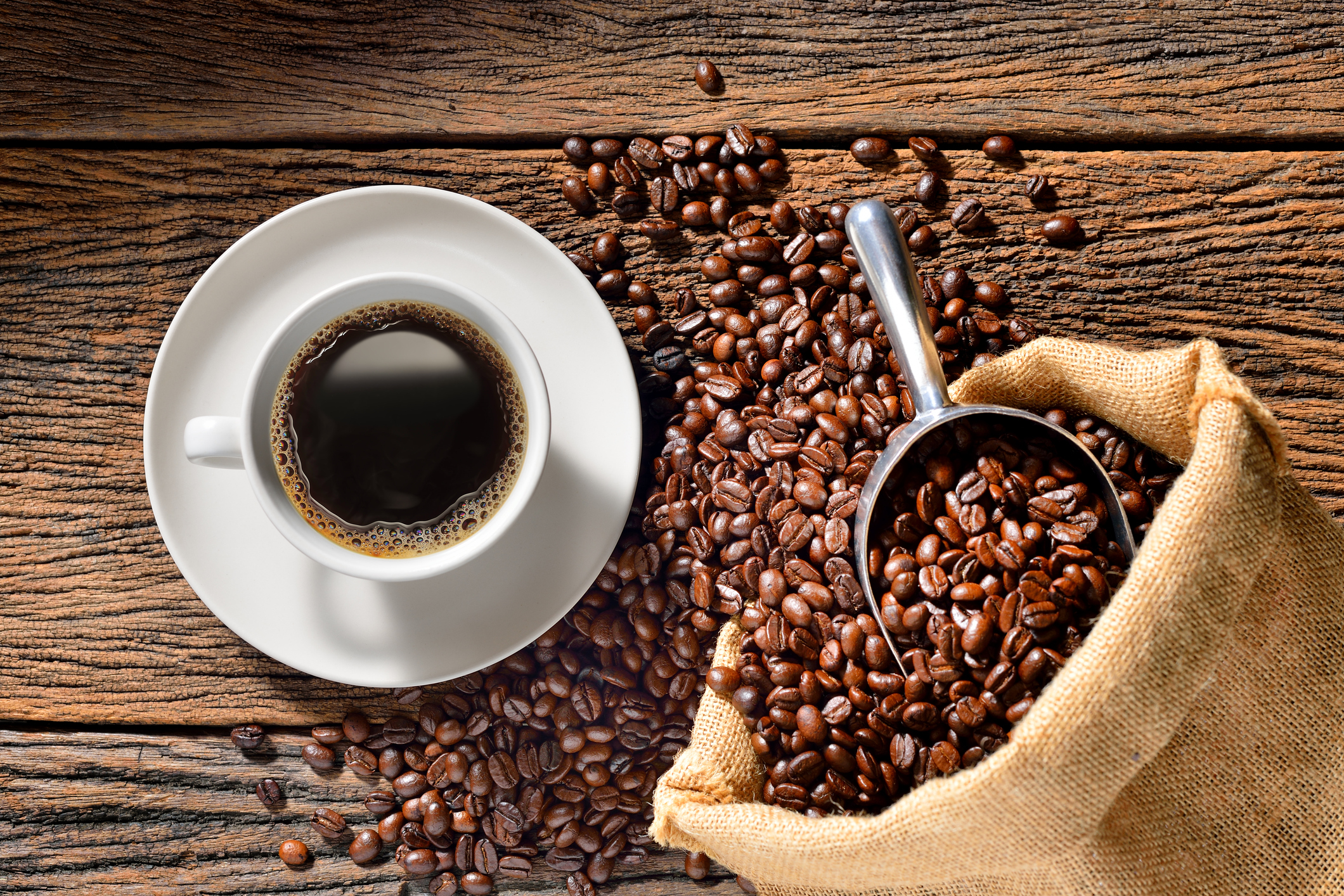Not many consumer products are truly timeless, but coffee passes the test. According to legend, a goat herder in Ethiopia discovered coffee more than 1,000 years ago after noticing the effects that the coffee plant had on his herd. Today, about 1 billion people around the globe drink coffee daily, making it the most popular beverage in the world.

Coffee stocks are companies that are primarily involved in the coffee business, either as café chains like Starbucks, wholesalers that sell packaged coffee, roasters, or even producers. For investors, such a product is clearly appealing.
Coffee has some addictive properties, but research has shown that it's generally good for your health when consumed in moderation. Additionally, the habitual nature of drinking coffee means that consumers aren't so sensitive to coffee prices. If you're looking to get a piece of a huge industry, keep reading to learn about eight of the best coffee companies you can own today.
Best coffee stocks in 2026
1. Starbucks
If you're looking for a pure-play coffee stock, Starbucks is your best bet. The company has come to dominate the global café industry by developing a brand synonymous with affordable luxury. It has defined itself as a third place between home and work where you can go to relax or meet up with friends. Today, Starbucks has about 40,000 locations worldwide, more than double those of Dunkin', its closest competitor.

NASDAQ: SBUX
Key Data Points
Although Starbucks has long seemed ubiquitous, the café chain continues to grow. It's expanding in China, now its second-largest market, where it's adding around 500 stores a year, and it recently took on a joint venture partner, Boyu Capital, to help drive its store base in China from 8,000 to 20,000 over time.
Starbucks was among the first restaurant chains to recognize the potential of a mobile app. It was a pioneer in areas such as digital payments, a rewards program, and mobile order and pay, allowing customers to order remotely and then pick up their orders upon arrival.
In addition to its cafés, Starbucks has a thriving business selling bagged coffee, ready-to-drink beverages, and other such products in supermarkets and convenience stores. The company has partnered with Nestlé on the Global Coffee Alliance, tapping the global food conglomerate to produce many of its products and sell them in new territories.
Although Starbucks may seem like a mature company, it still has growth opportunities, as it continues to open new stores and find new ways to grow.
The business has struggled through 2024 due to new low-priced competition in China and complaints about slow service in the U.S. However, investors are hopeful that new CEO Brian Niccol, whom the company poached from Chipotle (CMG +0.81%), can turn the business around.
Niccol has focused on bringing a human touch back to the brand, with baristas handwriting names on cups and serving drinks in mugs for customers staying in the café. In the company's fourth-quarter 2025, it reported positive global comparable sales for the first time in seven years, a sign that the turnaround is making progress.
In addition to opening new stores in China and elsewhere, the company is leveraging its potential in digital and delivery to make its existing store base more efficient. Starbucks has been a monster stock over the course of its history, but it might have to reinvent itself again to outperform the market.
2. Keurig Dr Pepper
The formation of Keurig Dr Pepper (KDP) was the result of a 2018 merger between Keurig Green Mountain and Dr Pepper Snapple. It was engineered by JAB, the private German holding company that's become a coffee juggernaut. The coffee companies that JAB owns outright or has significant stakes in include Keurig Dr Pepper, Krispy Kreme (DNUT -0.59%), Caribou Coffee, Peet's Coffee, and Panera.

NASDAQ: KDP
Key Data Points
Since it's a private company, investors can't own shares in JAB. But coffee investors should be aware of the company's influence on the industry since it's taken a number of coffee businesses private in recent years. It also led Krispy Kreme's initial public offering (IPO) in July 2021. As of May 2025, JAB owned 4.4% of Keurig Dr Pepper.
As a diversified beverage company, KDP owns a wide variety of brands in coffee and soft drinks, including Snapple, Canada Dry, Green Mountain, Mott's, and its namesake brands -- but coffee is the star here. About 40 million U.S. households now have a Keurig brewing system.
The Keurig system benefits from the razor-and-blades business model: Consumers have to buy high-margin K-Cup pods if they want to continue to use their machines. The investment in Keurig also dissuades users from switching to a competitor.
Now, Keurig Dr Pepper is undergoing another change that will split the company into two following its acquisition of Dutch coffee giant JDE Peet for $18 billion. Following the closing of that deal, which is expected in the first half of 2026, the company will split into a pure-play coffee company and a pure-play beverage unit, effectively unwinding the merger that created Keurig Dr Pepper.
Coffee investors should keep an eye out for the split, as the new pure-play coffee stock will be one of the biggest in the world.
3. Nestlé
Nestlé, the world's biggest food business, is a diversified conglomerate with more than 2,000 brands across categories such as coffee, tea, bottled water, candy and sweets, soups, condiments, and pet food. Although a company this diversified can't be distilled into a single product, coffee is a major component of its business, and brands such as Nescafé, Nespresso, and Coffee Mate are known around the world.
Nestlé's biggest category is powdered and liquid beverages, which includes the coffee brands Nescafé, Nespresso, and Starbucks. The segment delivered $30.8 billion of the company's $114.6 billion in revenue in 2024, and Nespresso contributed $8 billion in revenue last year. The company said coffee grew in the mid-single digits in 2024.
Overall, the powdered and liquid beverages category is highly profitable, with an underlying operating profit of 20%, making it the company's third-most-profitable category behind milk products, ice cream, and pet care.
It's important to distinguish coffee companies like Nestlé, a consumer staples company that sells its products in grocery and convenience stores, from Starbucks, which sells coffee as a discretionary item in restaurants. Nestlé's global reach, marketing power, and expertise in bottled beverages make it an ideal partner for a company such as Starbucks. Selling bagged coffee and ready-to-drink beverages has been a key source of growth for both companies.
Nestlé's new CEO, Philipp Navratil, who took over the company in September, said the company would cut 16,000 jobs over the next two years in a bid to cut costs and drive profitability.
4. J.M. Smucker
The brand name Smucker is synonymous with jams, jellies, and other spreads, but packaged coffee makes up a significant percentage of the company's business. Smucker's primary coffee brands are Folgers, Café Bustelo, and Dunkin', which it licenses from Dunkin' (now a part of Inspire Brands).

NYSE: SJM
Key Data Points
For fiscal 2025, which ended April 30, 2025, the U.S. retail coffee segment made up 32% of Smucker's total sales, or $2.8 billion of its $8.7 billion in total revenue. It's now the company's biggest category after it sold several pet food brands, including Rachael Ray Nutrish and 9 Lives. The coffee segment's revenue rose modestly in fiscal 2025, up 4%.
However, as is the case for the other companies on this list, coffee is a high-margin business for Smucker, generating an operating profit margin of 28% in 2025. That makes coffee the company's most profitable segment both by margin and volume. In fiscal 2024, coffee made up 37% of its operating profits.
With a collection of well-known brands and leadership in the U.S., coffee should continue to drive strong profits for Smucker.
5. Dutch Bros
After its September 2021 IPO, drive-thru-focused coffee chain Dutch Bros may be the latest to grab the mantle of the "next Starbucks." The Oregon-based coffee slinger is growing quickly, and it's easy to see why it has attracted so much attention from investors.

NYSE: BROS
Key Data Points
Employing a drive-thru model, Dutch Bros had more than 1,000 locations as of March 2025, and it's spreading across the country, operating in 18 states in mid-2025. This rapid growth and white-space opportunity make a bull case for the stock, as Dutch Bros sees room in the market for 4,000 locations.
The company's drive-thru model helps differentiate it from coffee chains like Starbucks, and its high average unit volumes indicate strong demand. Dutch Bros finished 2024 with average sales of $2.02 million at its stores, better than most fast-food restaurants.
Dutch Bros is now profitable on a generally accepted accounting principles (GAAP) basis, and its profitability should improve as the company gains more brand awareness and expands. For a coffee stock, Dutch Bros is expensive, but the underlying business looks promising, and the stock should reward investors if the company can reach its goal of opening 4,000 stores.
6. Black Rifle Coffee Company
Black Rifle, which went public through a special purpose acquisition company (SPAC) merger in February 2022, puts a unique spin on a commodity product by branding for a specific customer subset -- conservative Americans and veterans in particular. The company's mission is "to serve premium coffee and content to active military, veterans, first responders, and those who love America."
That distinct branding and its direct-to-consumer origins and marketing have helped the company quickly build brand awareness and sales. In 2024, its growth hit a wall. Revenue fell 1% to $391.5 million as earlier tailwinds from the COVID-19 pandemic that supported online sales of its coffee and branded merchandise unwound. However, its profitability improved, and its wholesale business grew.
Unlike the typical coffee company, Black Rifle also defines itself as a media company, and it's a lifestyle brand as much as a coffee brand. The company puts out a magazine and is active in political and cultural issues with its blog and on social media.
With a brand that also functions as an identity, a key component of its strategy is selling branded merchandise, such as apparel and equipment, that helps build awareness and gives its customers a way to signal their affinity for the brand.
Black Rifle has begun opening its own stores, which it calls "outposts," and had 36 locations at the end of 2024. However, most of its revenue now comes through the wholesale channel since it also sells ready-to-drink and bagged coffee through retailers such as 7-11, Publix, and Walmart (NYSE:WMT).
The company is also expanding beyond coffee with a new line of ready-to-drink Black Rifle Energy drinks. While Black Rifle's business model is still evolving, its unique brand has a loyal following, which can be a valuable asset in a competitive industry such as coffee.
7. Luckin Coffee
Luckin Coffee may be best known for an accounting scandal that sunk an earlier iteration of the company, leading to its delisting from the Nasdaq in 2019 and its bankruptcy. However, the company emerged from bankruptcy, restructured, and has built a viable and growing business under new ownership.

OTC: LKNC.Y
Key Data Points
The core concept is essentially the same as the original. Luckin, which is based in China, is undercutting Starbucks, which pioneered the coffee market in China. In fact, Luckin is now larger than Starbucks in China both in terms of store count and China-based revenue.
It has challenged Starbucks by blanketing China with stores and beating it substantially on price. It also appeals to a younger, price-conscious demographic looking for a daily dose of caffeine rather than the third place Starbucks is known for being.
As of November 2025, the company had a market capitalization of $11 billion and was seeing growth driven by both new stores and double-digit same-store sales growth. Luckin has even begun expanding outside of China and now has two stores in New York City.
The Chinese coffee chain has been one of the most surprising comeback stories in the market. Despite its earlier troubles, its formula now seems to be working.
8. Restaurant Brands International
Restaurant Brands International is a diversified restaurant operator with franchises like Burger King, Popeyes, Firehouse Subs, and Tim Horton's under its umbrella. Tim Horton's is the biggest source of profit of those four chains, so it makes sense to consider the company if you're interested in coffee stocks. Through the first half of 2025, Tim Horton's contributed $803 million in adjusted operating income out of a total $1.91 billion.

NYSE: QSR
Key Data Points
Tim Horton's is so profitable for Restaurant Brands because it owns the supply chain, selling products to its franchisees and earning a profit from it. Tim Horton's typically earns an adjusting operating margin of more than 10% as a percentage of systemwide sales, which is unusually high for a franchise business.
Restaurant Brands aims to grow its business by adding new franchise locations for its four chains, both in North America and internationally, and by acquiring new restaurant brands. So far, that strategy has had mixed results on the stock market, but Tim Horton's seems to be thriving under Restaurant Brands' management.
Why you should own coffee stocks
Coffee is a high-margin business for the world's top consumer products companies. It's also a timeless product that's likely to gain popularity as people in China and other countries move into the middle class and consumers seek alternatives to sugary beverages like sodas.
Although coffee is a competitive industry, it offers opportunities in both consumer discretionary and consumer staples stocks. Different types of investors can find the right fit, whether they're seeking growth stocks or dividend stocks. There may not be a lot of pure-play opportunities in the sector, but investors looking to perk up their portfolio should consider the six stocks above.
Here are a few reasons to consider owning coffee stocks:
- It's one of the most popular beverages in the world and has been for hundreds of years.
- Most of the Chinese population still doesn't drink coffee, representing a huge opportunity in that market.
- It's typically a high-margin product/business.
- It's generally considered healthy, unlike many competing beverages.
- Some coffee stocks are recession-resistant like consumer goods companies.
Related investing topics
How to invest in coffee stocks
If you're looking to invest in coffee stocks, the process is simple. Just follow the list below:
- Open your brokerage app: Log in to your brokerage account where you handle your investments.
- Search for the stock: Enter the ticker or company name into the search bar to bring up the stock's trading page.
- Decide how many shares to buy: Consider your investment goals and how much of your portfolio you want to allocate to this stock.
- Select order type: Choose between a market order to buy at the current price or a limit order to specify the maximum price you're willing to pay.
- Submit your order: Confirm the details and submit your buy order.
- Review your purchase: Check your portfolio to ensure your order was filled as expected and adjust your investment strategy accordingly.









